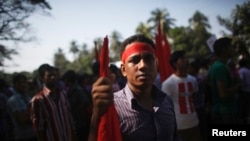DHAKA —
The opposition Bangladesh Nationalist Party (BNP) on Saturday announced another 84-hour nationwide strike, starting on Sunday, after police arrested BNP leaders, triggering violent protests across the country.
The aim of the strike is to force the ruling Awami League to hold elections, due by January at the latest, under a non-partisan caretaker government.
Prime Minister Sheikh Hasina has repeatedly refused. Instead, she has offered the formation of an all-party government to see through the elections with her staying in charge.
The deadlock, nothing new in Bangladesh, has led to the deaths of at least 18 people during several violent protests and shutdowns.
The mounting tension is a fresh threat to Bangladesh's $22 billion garment export industry, the economic lifeblood of the impoverished country of 160 million, which has already been rocked by a string of deadly factory accidents this year.
"To protest the arrests of our senior leaders, we were forced to extend the shutdown by another 12 hours to 84 hours," said Ruhul Kabir Rizvi, Joint Secretary General of the BNP.
Police early on Saturday arrested at least five senior leaders of the BNP including opposition leader Begum Khaleda Zia's adviser and a special assistant.
Police also raided the homes of other leaders.
"They were arrested on specific allegations as they were instigating attacks on people and their properties," said Shamsul Haqu Tuku, junior minister for home affairs.
After the arrests, pro-BNP activists went on the rampage, torching vehicles and blocking the Dhaka-Chittagong highway.
Bangladesh has also been hit by a wave of violent demonstrations over war crimes convictions dating back to the war of independence from Pakistan in 1971, with more than 100 people killed in protests and counter-protests this year.
The aim of the strike is to force the ruling Awami League to hold elections, due by January at the latest, under a non-partisan caretaker government.
Prime Minister Sheikh Hasina has repeatedly refused. Instead, she has offered the formation of an all-party government to see through the elections with her staying in charge.
The deadlock, nothing new in Bangladesh, has led to the deaths of at least 18 people during several violent protests and shutdowns.
The mounting tension is a fresh threat to Bangladesh's $22 billion garment export industry, the economic lifeblood of the impoverished country of 160 million, which has already been rocked by a string of deadly factory accidents this year.
"To protest the arrests of our senior leaders, we were forced to extend the shutdown by another 12 hours to 84 hours," said Ruhul Kabir Rizvi, Joint Secretary General of the BNP.
Police early on Saturday arrested at least five senior leaders of the BNP including opposition leader Begum Khaleda Zia's adviser and a special assistant.
Police also raided the homes of other leaders.
"They were arrested on specific allegations as they were instigating attacks on people and their properties," said Shamsul Haqu Tuku, junior minister for home affairs.
After the arrests, pro-BNP activists went on the rampage, torching vehicles and blocking the Dhaka-Chittagong highway.
Bangladesh has also been hit by a wave of violent demonstrations over war crimes convictions dating back to the war of independence from Pakistan in 1971, with more than 100 people killed in protests and counter-protests this year.





